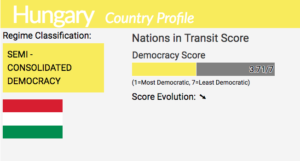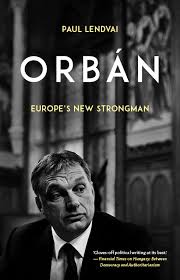Orban at CPAC brings the ‘far-right international’ into focus
 Hungarian Prime Minister Viktor Orban speaks at the Conservative Political Action Conference (CPAC) in Dallas on Aug. 4. (LM Otero/AP) |
By Ishaan Tharoor
with Sammy Westfall
The Washington Post, August 5, 2022
“The globalists can go to hell,” thundered Hungarian Prime Minister Viktor Orban. “I have come to Texas.”
He was delivering what was essentially the opening keynote of the four-day Conservative Political Action Conference (CPAC) in Dallas — the preeminent convening organization of the American right-wing movement. The conference Orban helped kick off will conclude in part with a speech from former president Donald Trump. And the message the Hungarian leader sent was one that united Republican anger at “liberal hegemony” with his own narrative of illiberal triumph.
In his remarks, Orban laid out the clearest platform yet for what some analysts have dubbed “the far-right international,” a notional alliance between far-right and ultranationalist parties on both sides of the Atlantic. He trumpeted his hard-line stances against immigration, his staunch Christian nationalism, his opposition to “gender ideology” and his indifference to those who view his quasi-autocratic rule as a threat to democracy in the heart of Europe.
Orban made no bones about his contempt for U.S. Democrats and the supposed liberal media. “They hate me and slander me and my country as they hate you and slander you,” Orban said of Democrats at CPAC. “We should unite our forces.”
“We must take back the institutions in Washington and Brussels … we must coordinate the movements of our troops because we face the same challenges,” Orban added, gesturing to the upcoming U.S. midterm and presidential elections and European parliamentary elections in 2024. “These two locations will define the two fronts in the battle being fought for Western civilization. Today, we hold neither of them. Yet we need both.”
Orban chose to gloss over the outcry that followed a major speech he made last month. Just across the border in neighboring Romania, in a picturesque town home to a considerable ethnic Hungarian population where Orban delivers an annual address, he warned, among other things, that Europeans must not “become peoples of mixed race.”
From his perch in Transylvania, Orban summoned the spectral menace of racist ideologies that have long haunted Europe. One long-term Orban adviser, Zsuzsa Hegedus, tendered her resignation with a letter that described Orban’s speech as “a pure Nazi text worthy of Goebbels,” and the “racist” culmination of an increasingly “illiberal turn.” (She later backtracked, appearing to echo Orban’s defenders that his remarks were misconstrued. You can read an English translation of his speech here.)
Orban supporters say that he was speaking principally about simply limiting migration and preserving European “civilization.” Even then, he used hopelessly bad historical analogies to make his claim, styling Hungary as a modern-day bulwark against Muslim encroachment as it was in supposedly fending off the Ottoman Empire at the gates of Vienna in 1683. In truth, the Ottoman army had myriad Christians in its camp, including thousands of Hungarian peasants marshaled by the Hungarian Protestant nobleman Imre Thokoly.
Whatever the case, Orban’s rhetoric now is a sign of an ideologue who is increasingly unrestrained on the world stage. “It’s one thing for Orban to drop words such as ‘replacement’ into his speeches — a dog whistle to white supremacists and their ‘Great Replacement Theory,’ but seemingly innocuous to other people,” wrote Andreas Kluth for Bloomberg Opinion. “It’s another to give speeches that sound like passages of the Nuremberg Race Laws of 1935.”
Was it “an accidental slip?” Kluth pondered. “Or a sign of growing confidence, signaling a clearer line in future?”
No matter the geopolitical feebleness of Hungary in its own right, Orban and his allies see themselves as standard bearers for an illiberal future. “We do hope that you can learn from us the political mind-set how to be a successful conservative, as we also learn from you, and from Ronald Reagan,” Miklos Szantho, director of the Center for Fundamental Rights, a Hungarian think tank believed to be funded by Orban’s government, said at a CPAC gathering organized in Budapest in May. “As he put it so many years ago, ‘We win, they lose.’ That is what the Hungarian right has done.”
Big elections are around the corner — from the United States to Italy, where a party whose origins are rooted directly in Italy’s fascist past may soon lead a new governing coalition, to Brazil, where embattled far-right President Jair Bolsonaro is already echoing Trump’s falsehoods over the threat of a stolen election.
In February, Bolsonaro visited Orban in Hungary and celebrated the “affinities” they shared and “values that we represent, which can be summarized in four words: God, homeland, family and freedom.” That motto, noted Brazilian newspaper Folha de S. Paulo, echoed the slogans of Italian fascists in the 1920s and ’30s, which were imported by their Brazilian counterparts and also given voice by the right-wing Portuguese dictatorship of António de Oliveira Salazar.
None of these observations or criticisms seem to check Orban and his ilk. On Thursday, he returned the favor, casting the West’s “liberal progressives” as the successors of totalitarian communism. “We have seen what kind of future the globalist ruling class has offered,” he said. “But we have a different future to offer.”
What is that future? I explored that in a three-part series earlier this year on Orban’s political impact on U.S. Republicans, many of whom admire his dismantling of Hungary’s media establishment, his war on LGBT rights and his aggressive attempts at boosting his country’s birthrates. They are quieter about — though possibly still supportive of — his bending of the country’s judiciary and erosion of European democratic norms.
“This is the desire to build an ‘illiberal international’: a world shaped by the kind of politics that eschews the rules-based international order, liberal democratic norms, and transparency; institutions, and norms that currently make it possible for the European Commission to sanction Orban’s government and for the West to sanction Putin’s Russia,” wrote Andras Toth-Czifra, a Hungarian expert at the Center for European Policy Analysis.
“By hitching themselves to someone who has put himself forward as a post-liberal intellectual, I think American conservatives are starting to give themselves permission to discard liberal norms,” Lauren Stokes, a historian at Northwestern University, told the New Yorker for a lengthy piece on Orban’s American appeal published in June.
“When a Hungarian court does something Orban doesn’t like — something too pro-queer, too pro-immigrant — he can just say, ‘This court is an enemy of the people, I don’t have to listen to it,’ ” she added. “I think Republicans are setting themselves up to adopt a similar logic: if the system gives me a result I don’t like, I don’t have to abide by it.”
“In order to win, it is not enough to know what you’re fighting for,” Orban told the CPAC crowd on Thursday. “You should also know how you should fight: My answer is play by your own rules.” That’s a message the Republicans appear to be hearing loud and clear.





 Viktor Orbán is
Viktor Orbán is This year Freedom House deemed Hungary only “partly free,” the first time in its history an EU member state has been denied the designation “free.”
This year Freedom House deemed Hungary only “partly free,” the first time in its history an EU member state has been denied the designation “free.” “You know the growth rates of Italy and some other European countries are much lower than Hungary’s. The Hungarian government is in a certain way very pro-business and is happy to attract business wherever it comes from with low taxes or longer working hours,” he adds.
“You know the growth rates of Italy and some other European countries are much lower than Hungary’s. The Hungarian government is in a certain way very pro-business and is happy to attract business wherever it comes from with low taxes or longer working hours,” he adds.